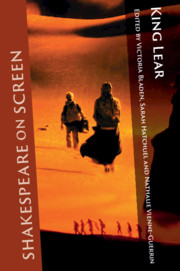Book contents
- Shakespeare on Screen: King Lear
- Series page
- Shakespeare on Screen: King Lear
- Copyright page
- Dedication
- Contents
- Illustrations
- Notes on Contributors
- Series Editors’ Preface
- Acknowledgements
- Chapter 1 Introduction: Dis-locating King Lear on Screen
- Part I Surviving Lear: Revisiting the Canon
- Part II Lear en Abyme: Metatheatre and the Screen
- Part III The Genres of Lear
- Part IV Lear on the Loose: Migrations and Appropriations of Lear
- Chapter 10 Relocating Jewish Culture in The Yiddish King Lear (1934)
- Chapter 11 The Trump Effect: Exceptionalism, Global Capitalism and the War on Women in Early Twenty-first-century Films of King Lear
- Chapter 12 Looking for Lear in The Eye of the Storm
- Chapter 13 Between Political Drama and Soap Opera: Appropriations of King Lear in US Television Series Boss and Empire
- Chapter 14 Afterword: Godard’s King Lear
- Chapter 15 King Lear on Screen: Select Film-bibliography
- Index
- References
Chapter 14 - Afterword: Godard’s King Lear
from Part IV - Lear on the Loose: Migrations and Appropriations of Lear
Published online by Cambridge University Press: 10 September 2019
- Shakespeare on Screen: King Lear
- Series page
- Shakespeare on Screen: King Lear
- Copyright page
- Dedication
- Contents
- Illustrations
- Notes on Contributors
- Series Editors’ Preface
- Acknowledgements
- Chapter 1 Introduction: Dis-locating King Lear on Screen
- Part I Surviving Lear: Revisiting the Canon
- Part II Lear en Abyme: Metatheatre and the Screen
- Part III The Genres of Lear
- Part IV Lear on the Loose: Migrations and Appropriations of Lear
- Chapter 10 Relocating Jewish Culture in The Yiddish King Lear (1934)
- Chapter 11 The Trump Effect: Exceptionalism, Global Capitalism and the War on Women in Early Twenty-first-century Films of King Lear
- Chapter 12 Looking for Lear in The Eye of the Storm
- Chapter 13 Between Political Drama and Soap Opera: Appropriations of King Lear in US Television Series Boss and Empire
- Chapter 14 Afterword: Godard’s King Lear
- Chapter 15 King Lear on Screen: Select Film-bibliography
- Index
- References
Summary
Godard’s extraordinary, demanding and unremittingly brilliant film, largely mocked and reviled, too often ignored, increasingly inaccessible can act as a kind of metafilmic analogy for the activity in the rest of this volume: its status not as a film of King Lear but as a film about the fragmentary possibility of making – or perhaps more accurately, not making – a film of King Lear, creating for itself a remarkably complex status as critical commentary on the materiality of what it is itself in the process of (not) creating. The chapter offers some brief comments on its commenting as a way to begin to think back over, as well as forward and beyond, the accomplishments of this volume.
- Type
- Chapter
- Information
- Shakespeare on Screen: King Lear , pp. 219 - 226Publisher: Cambridge University PressPrint publication year: 2019

